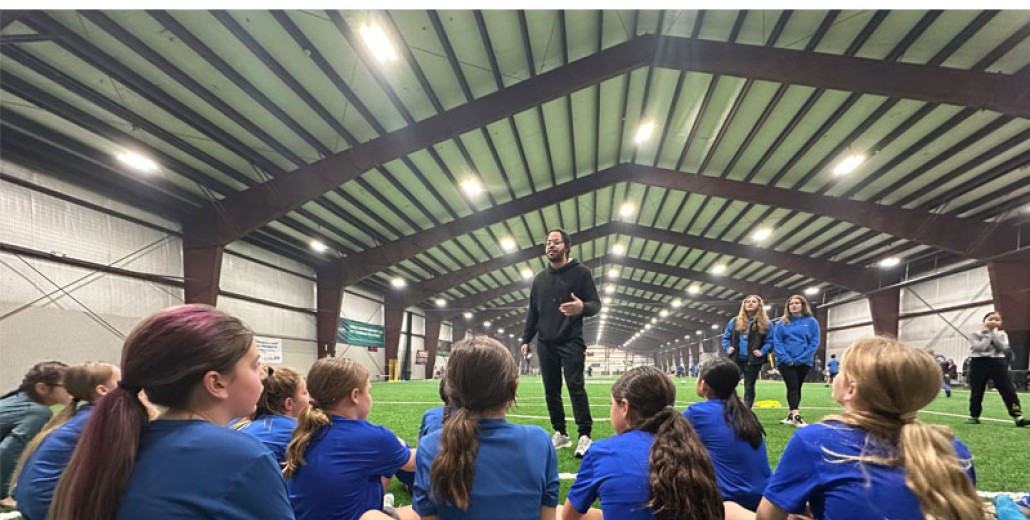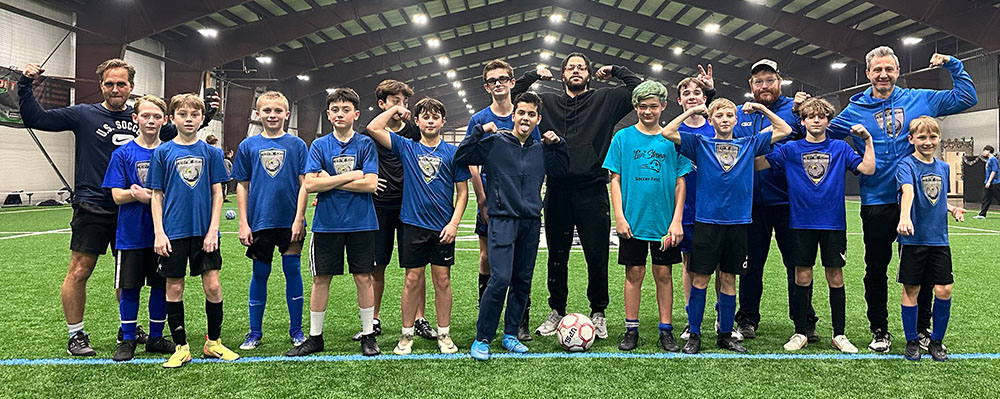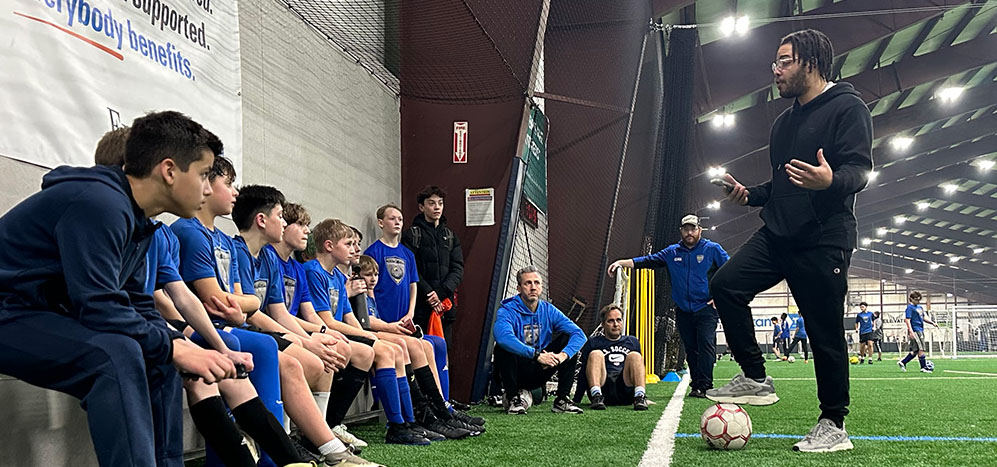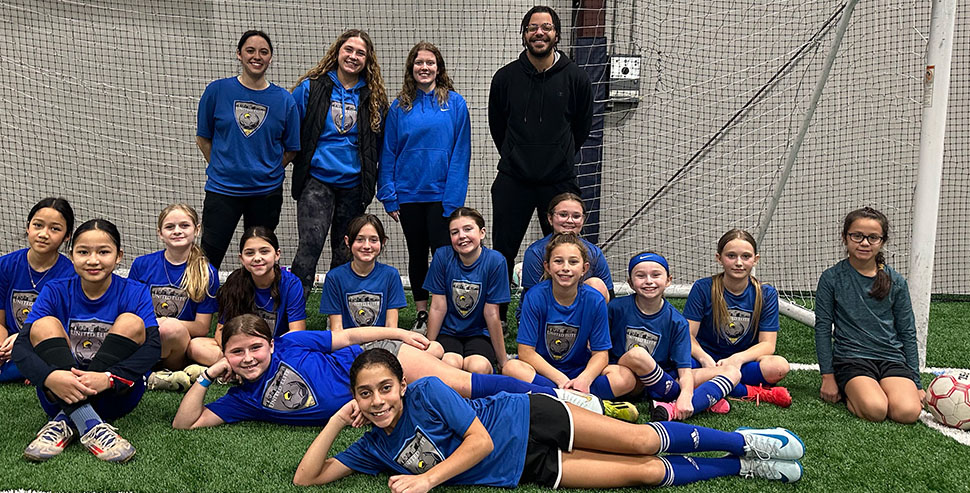
- Events & News
- Mental Health + Sports – Tips for Young Athletes and Parents from Naz Deloach
Mental Health + Sports – Tips for Young Athletes and Parents from Naz Deloach
Recently, Naz Deloach – one of ICAN’s Mental Health Ambassadors – came to Elevate CNY to talk to some young players from United Elite Krajisnik Football Club about the importance of recognizing and maintaining your mental health on and off the field.
Naz played soccer from 6 years old all the way up to college level – that’s almost 20 years involved in a sport he loves! He was the team captain senior year at Proctor High School in Utica and also on his college team at Mohawk Valley Community College (MVCC).
Now he is the owner of Dreamer Studios and 4K Creative Studios. He is a songwriter, producer, artist, content creator and more, and he works with us at ICAN to spread the word to youth about positive mental health and finding something you love to do to help you stay in a positive head space.
Sometimes it may be hard for parents or coaches to fold in lessons or time for mental health while balancing everything else that’s going on. Naz put together a few quick topics and tips from his talks to help both kids and parents navigate the important connection between mental health and sports.
We hope you find it helpful to start some great conversations!

FOR KIDS
_________________
What is mental health?
Naz asked young players to describe mental health and they came back with answers like: “your emotional state”, “how you feel inside your head”, “strength” and “your mind”. Kids… even though you’re young, you get it! If you sprain an ankle at practice, it hurts and then you take time to heal to physically feel better. Maybe you need an ankle brace or some medicine to help ease the pain. With mental health, you can also hurt inside and need to do the same – when you’re not feeling your best “inside”, rest, recuperate and heal so you can come back strong!
Try to focus and be where you are
Something negative could happen at school, on the bus or at home during the day and you have practice at night. Preparing mentally for that is key. If you’re at practice, try to be fully focused and AT practice. It will get your mind off things for a little bit. It will make you feel strong and grounded. Put your all into your physical self and your team, then come back to the issue you had with a clear head to start working through it.
Identify what can help you through the not so great days
Naz knows that you wake up every day differently. Sometimes you’re refreshed and spring out of bed and other times you wake up sad or mad and don’t even know why. Those “not so great” feelings are ok. Just like if you woke up with a little sniffle but can still manage your way through the day, if your mental health is not 100%, you can still move through the day but just do it more gently and focus on things that make you feel happy. Find your friends during the school day and enjoy their company. Walk your dog. Take a walk by yourself in your favorite place. Listen to some music, draw, watch your favorite show, eat your favorite snack or play some video games. Do what you have to do to feel more positive, tell yourself it’s ok to have an off day and always remember… tomorrow’s another opportunity to feel great!
Ways to keep cool on the field
Soccer is physical and you can get hit very hard. The ref can make a call that you don’t agree with. It can be very easy to snap and get that yellow card! Think of some things you can do to calm your brain down when things get tense on the field. You could have a phrase you say to yourself in your head (SO many athletes have those!), or find a teammate or coach that you can lean on for positive vibes. Get out of your head for minute and think of being in a place that makes you feel calm, think of a funny joke you heard or picture yourself making a goal. It’s hard… but it can keep you in the game physically AND mentally!

FOR PARENTS
_________________
Bring up mental health often, in good times and bad!
Don’t be afraid to bring up mental health, even if it’s just for a few minutes. While they’re sitting NEXT to you on the way to or from practice (and NOT directly across from you at a dinner table where it can feel more direct) is a perfect time. Use words and phrases they can understand and talk to them both on “bad” days AND good days so they don’t always equate mental health discussions with when they’re not feeling their best.
Some quick scenarios:
- “I’m super glad your ankle is feeling better. You feeling ok on the inside, too?”
- “It’s hard to lose a game. Go ahead and feel a little sad about that right now - let’s talk about it later if you want.”
- “You really got the team going today! Did you feel how you changed the whole mood of the team - it was awesome!”
- “It’s ok to have a bad practice or a bad day. I bet you even (insert favorite athlete here) does! Tomorrow will be better!”
Help your athlete help others
Young people having empathy and awareness of the moods and needs of their friends, family, classmates and teammates is so important. Small talks focused on this can help them think like a leader and have “captain mentality”, along with building social skills that will aid them in all aspects of life.
Here’s a few things to help them with that:
- “If one of your teammates is having a bad day, what are some things you could do to help them?”
- “(Name of teammate) seemed to be a little down at practice yesterday. Maybe they could use a big high five from you today!”
- “If you had to come up with a mantra for your team tonight to get them in a good mood, what would it be?!”
Actions can speak louder than words
You know this as well as we do - sometimes kids just don’t want to talk. To help your young athlete through a particularly hard day, a game loss or even an injury, sometimes small gestures can make a huge impact. Give them an extra half hour beyond bedtime to spend however they’d like. Do they love M&Ms? Drop some in their school bag or have them in the car when you pick them up. Give them a pass on a chore on that hard day. There’s so many little things that can spark positive mental health for them and make them feel better as they work through what they’re going through!

